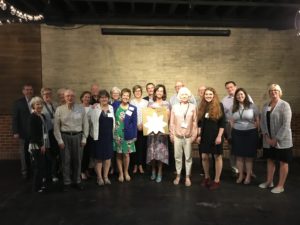Community | Winston-Salem, NC

The ZSR Board of Visitors gathered over dinner in Winston-Salem, NC on April 25, 2019 to discuss Community.
Overview and highlights of our Call to Conversation:
- We began our discussion by sharing personal stories about communities that we had been a part of and how those communities made us feel valued. From basic training to community theatre, from neighborhoods to online communities, from bands to volunteering at our children’s schools, we had many and varied examples of places where we found community.
- An important aspect of community that came up in our stories was that these were all places where we felt a strong sense of connection with others. Community is about relationships. As one group pointed out, you cannot have a community of 1. We value communities because they bring us in contact with other people; they are places where we feel valued and loved.
- Another theme that ran through our discussions was that of intentionality. Many of the groups where we felt the strongest sense of community were groups that shared a common purpose, places where we worked collaboratively with others towards a common goal.
- While we tend to look at community in a positive light, a theme that we also touched on was that of exclusion. Communities often form because of shared purpose, interests, values, even something as universal as shared geography. By definition, however, there are those that are part of the community vs. those that are not. It is important to recognize and acknowledge that even as a community can bring its members closer together it can also serve to shut other people out. It is important to recognize how the communities we belong to and those that we form can simultaneously be vehicles of both inclusion and exclusion.
- In a similar vein, all three tables also touched on the question of how we form communities across difference – whether it is differences in age, race, socio-economic status or values. We repeatedly touched on the importance of empathy and a willingness to listen to each other. One person shared that the best way they had learned to deal with different opinions was simply to say, “tell me more.” When we are curious enough to learn more about why people think what they think rather than disregarding opinions that are different from our own, we begin to build the connections necessary to form inclusive communities.
